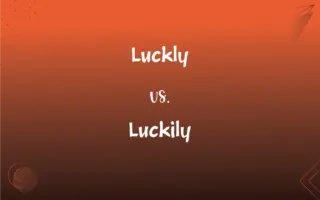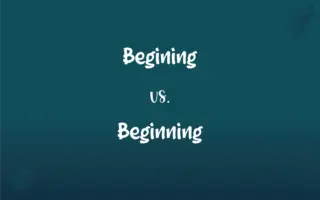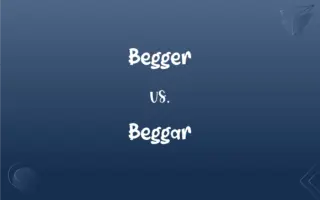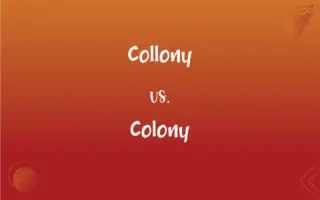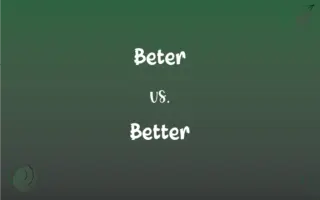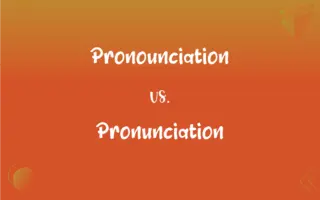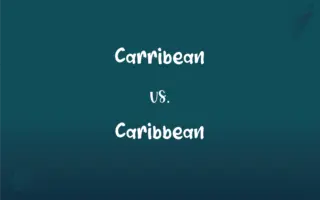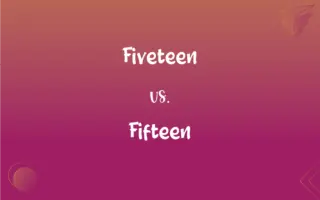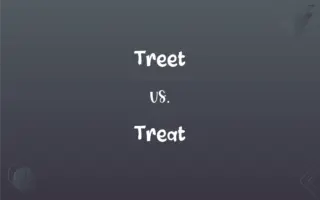Speled vs. Spelled: Mastering the Correct Spelling
Edited by Aimie Carlson || By Janet White || Updated on March 13, 2024
The incorrect spelling is "Speled". The correct spelling is "Spelled", denoting the past tense of the verb "spell".
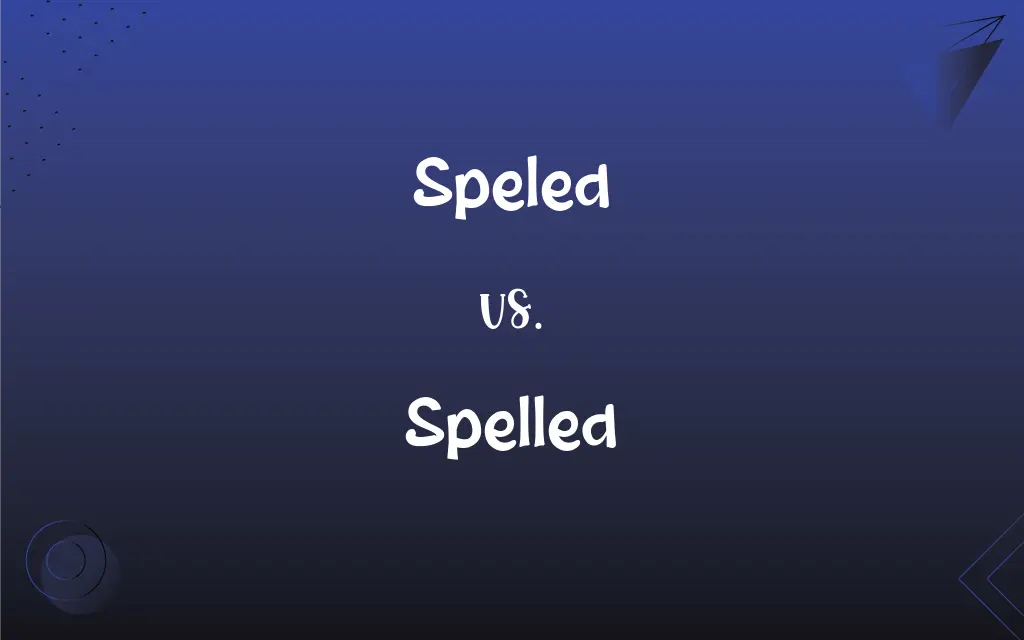
Which is correct: Speled or Spelled
How to spell Spelled?

Speled is Incorrect

Spelled is Correct
ADVERTISEMENT
Key Differences
Think of "speled" as missing an "l", similar to a spell gone wrong.
Pronounce "Spelled" and "Speled" aloud; the former should sound more familiar.
Recall common phrases like "misspelled" to reinforce the correct spelling.
Remember the double 'l' in "Spelled", similar to other past tense verbs like "travelled".
Associate the word "spell" with magic, which has an "l", and then double the magic for the past tense.
ADVERTISEMENT
Correct usage of Spelled
The word is not speled how it sounds.
The word is not spelled how it sounds.
I think I speled that wrong.
I think I spelled that wrong.
He speled the word incorrectly on the test.
He spelled the word incorrectly on the test.
The magician speled a curse over the village.
The magician spelled a curse over the village.
She speled her name for the barista.
She spelled her name for the barista.
Spelled Definitions
"Spelled" can also refer to briefly stating or outlining something.
He spelled out the instructions for everyone.
"Spelled" can also denote determining or bringing about something.
That decision spelled disaster for the project.
"Spelled" can refer to meaning or signify something.
The dark clouds spelled rain.
"Spelled" is the past tense and past participle form of "spell", indicating how a word is formed.
He spelled the word correctly.
"Spelled" may describe when someone took the place of another.
She spelled him at the reception desk during lunch.
To name or write in order the letters constituting (a word).
To constitute the letters of (a word)
These letters spell animal.
To add up to; signify
Their unwise investment could spell financial ruin.
To name or write in order the letters of a word or words
I've never been able to spell very well.
To put (someone) under a spell; bewitch.
To relieve (someone) from work temporarily by taking a turn.
To allow (someone) to rest a while.
To take turns working.
(Australian) To rest for a time from an activity.
A word or formula believed to have magic power.
A bewitched state or trance
The sorcerer put the prince under a spell.
A compelling attraction; charm or fascination
The spell of the theater.
A short, indefinite period of time.
(Informal) A period of weather of a particular kind
A dry spell.
One's turn at work.
A period of work; a shift.
(Australian) A period of rest.
(Informal) A period of physical or mental disorder or distress
A dizzy spell.
(Informal) A short distance.
Simple past tense and past participle of spell
Spelled Sentences
They spelled disaster for the project from the start.
He spelled his love with a grand gesture.
She spelled her complaint in a letter to the company.
The child spelled the word correctly on the board.
The banner was beautifully spelled with their names.
She spelled out the instructions clearly.
The game spelled fun for everyone involved.
The stars spelled their fate, according to the astrologer.
Victory was spelled in their determined faces.
The ancient book spelled out the rules of the magic.
The decorations spelled "Happy Birthday" in bright letters.
The event spelled the beginning of a new era.
The signs spelled trouble ahead.
The agreement was spelled out in the contract.
The teacher spelled the importance of hard work.
He spelled his intentions in a heartfelt letter.
The prophecy was spelled on the ancient walls.
The fog spelled a delay for their journey.
The exam spelled anxiety for many students.
The brochure spelled the benefits of joining the club.
The actions of the hero spelled hope for the city.
The recipe spelled out each step in detail.
The letter spelled out the terms of the agreement.
The email spelled the end of their partnership.
The poem spelled her feelings more clearly than words.
Spelled Idioms & Phrases
Spelled trouble
To indicate or signify impending difficulty or danger.
The dark clouds spelled trouble for the picnic.
Spelled the end
To cause the termination or conclusion of something.
The scandal spelled the end of his career.
Spelled success
To lead to or indicate a successful outcome.
Their hard work spelled success for the project.
Spelled it out
To explain something in very simple terms.
She spelled it out for him, but he still didn't understand.
Spelled out
To make something clear and understandable.
The rules were spelled out in the handbook.
Spelled relief
To bring or signify relief.
The arrival of the rescue team spelled relief for the stranded hikers.
Spelled doom
To indicate an inevitable failure or downfall.
The declining sales spelled doom for the company.
Spelled disaster
To predict or cause failure or catastrophe.
The technical malfunction spelled disaster during the live performance.
Clearly spelled
Clearly defined or explained.
The contract's terms were clearly spelled to avoid confusion.
Spelled victory
To lead to or suggest a win or success.
The team's early goal spelled victory in the championship match.
FAQs
Which vowel is used before Spelled?
The vowel "e" is used before "Spelled" in words like "misspelled".
Why is it called Spelled?
It's called "Spelled" because it's the past tense and past participle of the verb "spell".
Which preposition is used with Spelled?
Prepositions like "out" can be used with "spelled", as in "spelled out".
What is the verb form of Spelled?
The base verb form is "spell".
What is the root word of Spelled?
The root word is "spell".
What is the pronunciation of Spelled?
The pronunciation of "Spelled" is /spɛld/.
Is Spelled a negative or positive word?
"Spelled" is a neutral word.
What is the singular form of Spelled?
"Spelled" is already in its singular form.
What is the plural form of Spelled?
"Spelled" is a verb and doesn't have a plural form.
Which conjunction is used with Spelled?
Conjunction usage is context-dependent, and there's no specific conjunction always paired with "spelled".
Is Spelled a vowel or consonant?
The word "spelled" begins with a consonant.
Which determiner is used with Spelled?
Determiners like "this", "that", or "my" can be used with "spelled".
What is the first form of Spelled?
The first form is "spell".
Which article is used with Spelled?
"A" or "an" can be used with "spelled", depending on the context.
Is Spelled an adverb?
No, "spelled" is not an adverb.
Is the word Spelled imperative?
No, "spelled" is not an imperative word.
How do we divide Spelled into syllables?
"Spelled" is divided as spelled.
What is a stressed syllable in Spelled?
The entire word "spelled" is stressed.
What is the opposite of Spelled?
There isn't a direct antonym for "spelled" but in terms of incorrectly forming a word, "misspelled" can be used.
Is Spelled an abstract noun?
No, "spelled" is a verb.
Is Spelled a collective noun?
No, "spelled" is not a collective noun.
Is the Spelled term a metaphor?
No, "spelled" is not inherently metaphorical but can be used in metaphorical expressions.
How many syllables are in Spelled?
"Spelled" has one syllable.
What part of speech is Spelled?
"Spelled" is a verb.
What is the second form of Spelled?
The second form is "spelled" (American English) or "spelt" (British English).
Is Spelled a noun or adjective?
"Spelled" is a verb.
How is Spelled used in a sentence?
"She spelled the word without hesitation."
Is Spelled a countable noun?
"Spelled" is a verb and doesn't have countable properties.
What is another term for Spelled?
Another term is "indicated" or "signified", depending on context.
What is the third form of Spelled?
The third form is "spelled" (American English) or "spelt" (British English).
About Author
Written by
Janet WhiteJanet White has been an esteemed writer and blogger for Difference Wiki. Holding a Master's degree in Science and Medical Journalism from the prestigious Boston University, she has consistently demonstrated her expertise and passion for her field. When she's not immersed in her work, Janet relishes her time exercising, delving into a good book, and cherishing moments with friends and family.
Edited by
Aimie CarlsonAimie Carlson, holding a master's degree in English literature, is a fervent English language enthusiast. She lends her writing talents to Difference Wiki, a prominent website that specializes in comparisons, offering readers insightful analyses that both captivate and inform.
